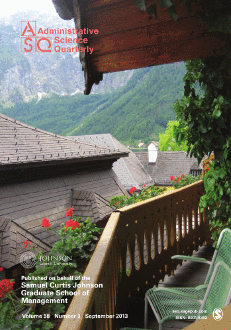ASQ Award for Scholarly Contribution
We are pleased to congratulate the winners of the 2013 Administrative Science Quarterly Award for Scholarly Contribution. This prestigious annual award recognizes the article published 5 years previously in ASQ that was judged to have had the greatest scholarly impact.
After carefully considering a slate of finalists, a committee of board members presented this year’s award to Luis R. Gómez-Mejía, Katalin Takács Haynes, Manuel Núñez-Nickel, Kathryn J. L. Jacobson, and José Moyano-Fuentes for their article ‘‘Socioemotional Wealth and Business Risks in Family-controlled Firms: Evidence from Spanish Olive Oil Mills,’’ published in the March 2007 issue. The winners were honored at the Academy of Management Annual Meeting this month in Orlando.
 Dr. Jerry Davis, Editor of ASQ, said:
Dr. Jerry Davis, Editor of ASQ, said:
The authors examined the histories of 1200 olive oil mills in Spain over a half-century period to understand how family ownership influences risk taking. Firms had the option of joining co-operatives, which lowered business risk but also resulted in the loss of family control. Traditional theories imply that family-controlled businesses are highly risk averse because much or all of the family’s wealth is invested in the firm, giving family owners strong reason to choose the safer path of joining a co-op. Drawing on the concept of socioemotional wealth and on psychological theories of risky choice, however, the authors found that “family firms are willing to risk financial losses and bear a greater probability of failure in order to maintain control of the firm.” This finding, along with the paper’s other insights, have made it an important touchstone in the literatures on entrepreneurship and family business.
According to Dr. Davis, the award committee said:
This paper stood out among a very strong group of papers for the novelty and potential impact of a key concept, i.e., socioemotional wealth. By incorporating non-financial aspects that meet a family’s affective needs into the utility function, the authors formulate novel hypotheses about family firms’ risk-taking decisions. These hypotheses, while differing from standard behavioral decision theory accounts of when firms take risks, are still consistent with the logic of the theory (i.e., loss aversion and risk taking when performance falls below a threshold) and therefore contribute to it. This sophisticated addition to a mature theory is commendable. Also noteworthy is the painstaking data collection and meticulous analysis, which show compelling support for the theory. Finally, we think that a paper (and a strong one at that) that examines the important but understudied setting of family-owned businesses is praiseworthy.
For the same article, the authors also received the 2013 Greif Research Impact Award from the Entrepreneurship Division of the Academy of Management. This prize is given annually to the authors(s) of the most impactful entrepreneurship article published 6 years previously in top management and entrepreneurship journals.
Our congratulations to the winners!































































































